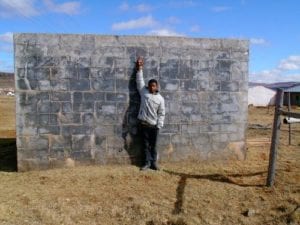Rural drought management
A pilot project, based on a series of community and local authority workshops, has focused on Tsengiwe village near Cala (four hours’ drive from East London) in the Eastern Cape.
Cape Town-based earth sciences and water consultancy Umvoto Africa is undertaking a two-year study funded by the Water Research Commission (WRC) to examine rural attitudes towards climate change and how the company can increase its resilience.
Tsengiwe, like many other rural villages, is vulnerable to seasonal drought. Climate change can be seen in a shift from summer-dominated rainfall to more autumnal rains; this is often associated with episodic downpours. The shift of the wet growing season has placed demands on summer crop selection and created an agricultural drought condition.The situation is exacerbated by poor infrastructureand a lack of municipal services.
The community leads
Initial work identified and prioritised the hazards facing the community and its coping mechanisms, leading to the next stage: community development plans for climate change adaptation and disaster risk reduction.
“At the first workshop, it was striking to note the local recognition of the problem we are addressing – that the climate is changing,” said Umvoto Africa MD, Rowena Hay. “Most visible to local people is a major shift in the seasonality of events, with very serious implications for cropping and livelihoods.”
Practical training
Training the youth has been an important component of the project.Thirteen young people were in monitoring and evaluation, which covered basic research principles and ethics and how to conduct a survey and an interview.The Umvoto team, in addition,trained two young people in hydrocensus work – how to follow the quality management systems procedure to fill out hydrocensus forms correctly and record data in a report.
Resource mapping
Umvoto also held a participatory mapping exercise,based on a GIS map that staff had created. The community mapped resources and land uses that they felt were important for their development plans. These included communal land, water sources and infrastructure and major agricultural projects, as well as vulnerable areas with large dongas, areas overridden with alien vegetation, flooding zones and major soil erosion.
Support
The third workshop in August was attended by the extension officer from the Eastern Cape Department of Rural Development and Agrarian Reform (DRDAR) and the institutional and support officer from the Department of Water Affairs (DWA). Thisenhanced the people’s knowledge of government support.
There are now five community development plans based on water supply and reticulation, agriculture and crop cultivation, animal grazing management, soil erosion and school greening. These serve as a road map to guide the community and local mentors through procedure and process.
The persons trained to monitor and evaluate will monitor the implementation of these plans, as well as the routine water service delivery by the local municipality, said Hay. For the duration of the project, this information will be given to Umvoto, which can facilitate as needed to ensure ongoing progress.
“In due course, this will not be necessary, as constructive relationships are built between the community and relevant government officials,” she said. “In the event of informed and objective feedback on failure to deliver, the community has the information on who to approach in the various hierarchies in order to motivate for improved service delivery.
“Failing acknowledgment of community considerations and positive intervention by government, it would be necessary to engage in either conflict resolution approaches or media pressure. The frustration of unfulfilled expectations, poverty and not being heard can lead to protests, and efforts need to be made in advance to avoid this.”
Development projects that could be implemented by the community include land care and rehabilitation, accessing groundwater supplies, building a small dam to supply food gardens and water for stock, catchment rehabilitation and the selection of new crops with a short growing season to suit changing climate conditions. Planning is empowerment“The take-home message is to work with what is available; have long-term goals; and interface constructively with official channels and processes,” said Hay. Risk management promotes self-mobilisation and active participation, leading to empowerment(especially of women) and the ability to hold government accountable for ensuring rights are met. It supports the move to responsibility and constructive engagement by all role players. An informed community cannot be misled by empty or unrealistic promises. Risk management can secure sustainable service delivery and operations and maintenancein the water services sector.”







